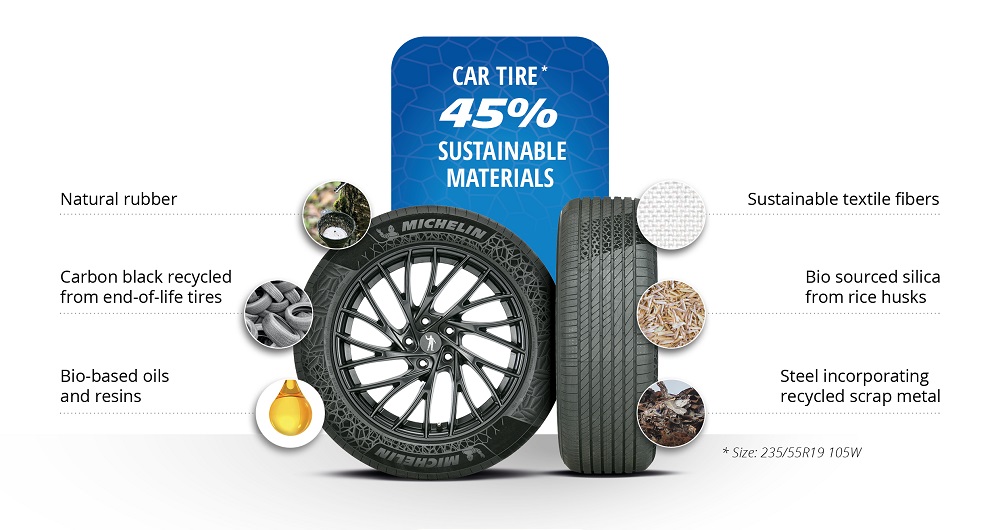-
An award in the ‘Chassis, Car Body & Exterior’ category for Michelin road-approved car tires, containing 45% sustainable materials.
-
A unique sustainable materials strategy which stands out for its high standards, scope, partnership dimension and overall vision.

On July 13 in Frankfurt, Michelin received the AutomotiveINNOVATIONS Award 2023 in the ‘Chassis, Car Body & Exterior’ category for its road-approved car tires containing 45% sustainable materials. The award was presented by PricewaterhouseCoopers (PwC) and the Center of Automotive Management (CAM) which, for over a decade, has conducted studies with manufacturers and suppliers to identify major innovations in the automobile industry. For the occasion, a jury was composed of seasoned figures from the industry, the world of science and consulting, as well as the specialized media.
Michelin’s sustainable materials strategy is unique in terms of its high standards, scope, partnership dimension and comprehensive approach throughout the product’s life cycle
A stringent definition for sustainable materials
Today there is no single definition for sustainable materials. This lack of definition impairs the readability of the different processes currently implemented in the tire industry. Michelin considers sustainable materials to be those that are recycled or renewable over the scale of a human lifetime. This is why the Group is pushing for industry consensus on a common and stringent definition of what makes a material sustainable.
A far-reaching sustainable materials vision, deployed across all of the Group’s products
Michelin aims to roll-out its sustainable materials strategy across all of its products and not only for one product or several ranges. This deployment requires in-depth transformation of methods, tools and industrial processes. More broadly speaking, the research and development and industrial challenges will require the creation of new sectors and value chains. Unparalleled in the sector in terms of scope, this ambition illustrates the Group’s willingness to overhaul the design and manufacture of its products to help safeguard our planet.
An unprecedented partnership dimension to accelerate research and innovation
Aware that the speed and nature of innovations in the field of sustainable materials call for new skills, the Group has embarked on a program of targeted partnerships, allowing it to step up the development of breakthrough technologies, in particular in the areas of transformation and recycling. Examples being Pyrowave (r-styrène), Carbios (r-PET), Enviro (rCB), IFPEN/Axens, with the participation of ADEME (bio-butadiene), the Empreinte* project conducted with ADEME and the BlackCycle and Whitecycle circular economy projects that Michelin undertakes alongside a number of European partners with support from the EU to transform end-of-life tires into very high-quality raw materials to be reincorporated into new tires.
A comprehensive approach spanning the entire length of a product’s life cycle
In order to take into consideration all of the parameters and environmental impacts of tires, the Group has implemented a 360° approach, based on an analysis of the life cycle of tires; from the choice of raw materials right up to recycling solutions, within a general framework of eco-design. This willingness goes well beyond simply being capable of developing and incorporating sustainable materials in tires, and aims to act on all levers at each stage of the life cycle of tires (design, manufacture, transport, use and end-of-life).
An award which commends Michelin’s commitment to producing tires containing 100% sustainable materials by 2050, with an interim target of 40% by 2030
Unveiled in 2022, the 45% sustainable materials tire incorporates technologies which will feature in standard tires in 2025. It enables Michelin to take a further step towards the large-scale development of new sustainable materials. It illustrates Michelin’s innovation capacity, as well as the strides made by the Group to uphold its commitments to promote global production, obtained exclusively using renewable or recycled materials by 2050, with an interim target of 40% on average by 2030.

